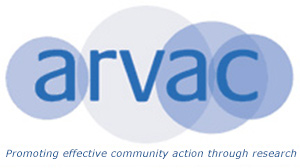1. Why do community research?
What is research?
Research is a way of finding and gathering information in a systematic way. It can help you to review how you are doing and to plan for the future. It can be very simple, asking questions like:
- How many people visited our community centre last year?
- What were the most popular activities?
As well as finding out facts and figures, research will put this information into context. For example, knowing that 317 people used your community centre last year is only the first step. You will also need to know things such as:
- Is this as many as we expected? Did they like using it?
- Did some people use it more often than others? Why?
- Why didn’t more older people (or young people / parents / people with disabilities / people from the new estate) use it?
- How have other community centres attracted a broad range of people?
You might then find yourself asking more general questions …
- How has our community changed in the last few years?
- What are the issues that people living here face in their daily lives?
- What services or resources do people need?
- Who should be providing what services?
Approaching these questions in a structured way, gathering your information, thinking about explanations and using what you find out to help you develop your project – these are all parts of the research process.
Why do community groups need to do research?
It is easy to get in a rut and deliver the same things to the same people but doing research could help you to find out what people think of your services and what other things they would like you to do.
Increasingly community groups are being asked to prove the need for their services to funders – to provide evidence of their effectiveness or to provide data on how many people use the service or how they benefit from using that service. They also need to be accountable to their users, the broader community and their funders. They also need to demonstrate to funders that they are consulting with their users. In a climate of tight control on local government spending, each service needs to show its unique value
Research carried out by your community group can help you to:
- Assess the particular needs and wants of a group of people or local community.
- Find out if people’s needs are being met.
- Identify trends in services.
- Map existing local services and organisations and find out what others are doing.
- Monitor and evaluate a service or a project.
- Measure the impact of what you do – what changes as a result of your activities.
It can also help you to:
- Provide information for fundraising, lobbying or campaigning.
- Deliver services and activities in a way that is best for people.
- Prioritise and make best use of limited resources.
- Create a good relationship with those who use your services.
- Encourage people to get involved in your group or organisation.
- Promote your group or organisation as open and accountable to users.
Here are some examples of the way community groups have used research methods for –
1 Service development
To shape current or future services in order to deliver more focused and relevant services to users. This can include consulting your users about what is needed, or evaluating existing services.
2 Funding
To apply for funding for service development, using research as evidence of need. This can include conducting needs assessments, feasibility studies and mapping service provision.
Example: A neighbourhood organisation wanted to investigate whether a furniture recycling project would be feasible. An additional aim for the project would be to provide work in an area of youth unemployment. With the aid of a consultant, they investigated grant funders looking at a wide range of suitable grants to set up the project, and also whether there were opportunities to be a provider for large, government funded return to work programmes. They researched other similar projects to find out if a) there was a reliable source of furniture that they could work with and, b) what the charging policies are – to prove that they could earn enough from selling the furniture. They also identified an appropriate structure for the management of the project and drew up a possible business plan.
3 Lobbying for change
Lobbying local service providers to make changes in the services they provide.
Skills and preparation
Community and voluntary groups often grapple with the question ‘is our research “proper” research?’ As long as you follow the basic principles which underpin all research, your research will be valid. The basic skills needed to carry out research are the ability to:
- Know what you want to find out.
- Ask the right questions.
- Listen to what people are actually saying.
- Take accurate note of the answers.
- Observe what is going on around you.
- Think about what the answers might mean.
- Be ethical in your approach and honest and unbiased about what you find out.
- Make sure you have enabled all parts of the target group to contribute.
In Section 3 we explore in more detail the skills and people that will be needed to do your research.
There are a number of useful techniques that help us carry out research and get the best results we can. We explain some of these in later sections of the toolkit.
The key to successful research is careful planning. Planning will also help you make best use of the limited time and resources you have available. You need to be clear about what you actually want to find out and why. An understanding of basic research theory will help you to ask the right questions, use appropriate methods and collect relevant information.
Building support and engagement
Many areas and communities have been the focus of lots of different types of research and consultation: needs analyses, benchmarking exercises, community audits. You may sometimes meet hostility or apathy if people suspect that your research will not lead to anything happening as a result – so ask yourself:
- How will we use the findings of this research?
- How will this research help to change things?
- What notice will be taken of the results of this research?
- How do we communicate the results to the people involved in the research?
- You may find there are some other objections to overcome as well.
It costs too much/takes too long, but …
- Collecting basic information can be very useful and involve little extra time on a daily basis.
- Collecting information can be built into your everyday work practice. For example, brief evaluation forms, a comments and suggestions book, a questionnaire in a local newsletter, asking staff for their views.
- In the end it’s a waste providing things that people don’t want. An investment in consultation and research may save resources in the future.
- Overall, it contributes to the value of the organisation.
It raises people’s expectations, but …
- Make it clear why you are doing your research.
- Always explain the context of the research and be clear where you can make or influence changes.
You can’t consult everyone, but …
- You can use appropriate methods to make sure you get a cross-section of views.
- Think about all the groups of people whose voices should be heard and the different ways of including them.
- You can give everyone the opportunity to contribute
People will never agree …
- You’re probably right!
- At least you will be able to make decisions with information about the different views and the issues involved.
People aren’t interested …
- People are busy and may think that you won’t take any notice of their views anyway. There is a danger of over-consulting and no results emerging.
- Make it easy for people to participate
- Encourage people to get involved. It can be very exciting and a good learning experience.
No one has complained so far …
- Never assume that your service is perfect.
- If you haven’t had complaints it may be that people don’t know how to complain, can’t be bothered or think you won’t listen.
- Ask people for their views, you will be surprised what useful suggestions they might come up with.
Be prepared to act, otherwise what is the point of consulting?
- Make sure you report back the results and, if necessary, explain why suggestions couldn’t be implemented.
Where will your information come from?
There are really only two ways of getting hold of information:
- Finding it out yourself. This is called ‘primary research.’ Most of this pack is about groups doing research themselves. This enables you to ask the specific questions to the specific people you are interested in finding out about.
- Using information already collected. This is known as ‘secondary research’ or ‘desk research.’ It can include information your organisation already holds as part of your monitoring and evaluation or previous research you or others have done. See section 10 for sources of information to help you with your research. This can be helpful to put your own questions into a wider context. How do your findings sit against the picture for your general area, or the country as a whole?
You will probably need a mixture of primary and secondary research, if only to find out if the answers to your questions already exist, or research has already been done on your topic.

